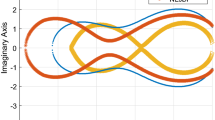Abstract
In this paper, explicit peer methods are studied in which some of the stage values are copies of stage values from previous steps. This allows to reduce the number of function calls per step and can be interpreted as being a generalization of the first-same-as-last principle known from Runge–Kutta methods. The variable step size implementation is more complex as the nodes depend on the history of previous step size changes. Optimally zero stable explicit peer methods up to order \(p=8\) are constructed using constraint numerical optimization. In addition the constructed methods are superconvergent of order \(s+1\) for constant step sizes. The new methods show their efficiency in comparison with the Matlab codes ode23, ode45 and ode113 in numerical experiments.







Similar content being viewed by others
References
Bogacki, P., Shampine, L.F.: A 3(2) pair of Runge–Kutta formulas. Appl. Math. Lett. 2(4), 321–325 (1989)
Butcher, J.C.: Numerical Methods for Ordinary Differential Equations. Wiley, New York (2008)
Calvo, M., Montijano, J.I., Rández, L., Van Daele, M.: On the derivation of explicit two-step peer methods. Appl. Numer. Math. 61(4), 395–409 (2011)
Dormand, J.R.: Numerical Methods for Differential Equations. CRC Press, Boca Raton (1996)
Dormand, J.R., Prince, P.J.: A family of embedded Runge–Kutta formulae. J. Comput. Appl. Math. 6, 19–26 (1980)
Hairer, E., Nørsett, S.P., Wanner, G.: Solving Ordinary Differential Equations I: Nonstiff Problems. Springer, Berlin (1993)
Horváth, Z., Podhaisky, H., Weiner, R.: Strong stability preserving explicit peer methods. J. Comput. Appl. Math. 296, 776–788 (2016)
Kulikov, GYu., Weiner, R.: Variable-stepsize interpolating explicit parallel peer methods with inherent global error control. SIAM J. Sci. Comput. 32, 1695–1723 (2010)
Shampine, L.F., Reichelt, M.W.: The MATLAB ODE suite. SIAM J. Sci. Comput. 18(1), 1–22 (1997)
Schmitt, B.A., Weiner, R., Beck, S.: Two-step peer methods with continuous output. BIT Numer. Math. 53, 717–739 (2013)
Weiner, R., Biermann, K., Schmitt, B.A., Podhaisky, H.: Explicit two-step peer methods. Comput. Math. Appl. 55, 609–619 (2008)
Weiner, R., Podhaisky, H., Klinge, M.: Explicit peer methods with variable nodes. Report 03, Institute of Mathematics, Martin Luther University Halle-Wittenberg (2016)
Weiner, R., Schmitt, B.A., Podhaisky, H., Jebens, S.: Superconvergent explicit two-step peer methods. J. Comput. Appl. Math. 223, 753–764 (2009)
Author information
Authors and Affiliations
Corresponding author
Additional information
Communicated by Mechthild Thalhammer.
Rights and permissions
About this article
Cite this article
Klinge, M., Weiner, R. & Podhaisky, H. Optimally zero stable explicit peer methods with variable nodes. Bit Numer Math 58, 331–345 (2018). https://doi.org/10.1007/s10543-017-0691-8
Received:
Accepted:
Published:
Issue Date:
DOI: https://doi.org/10.1007/s10543-017-0691-8




